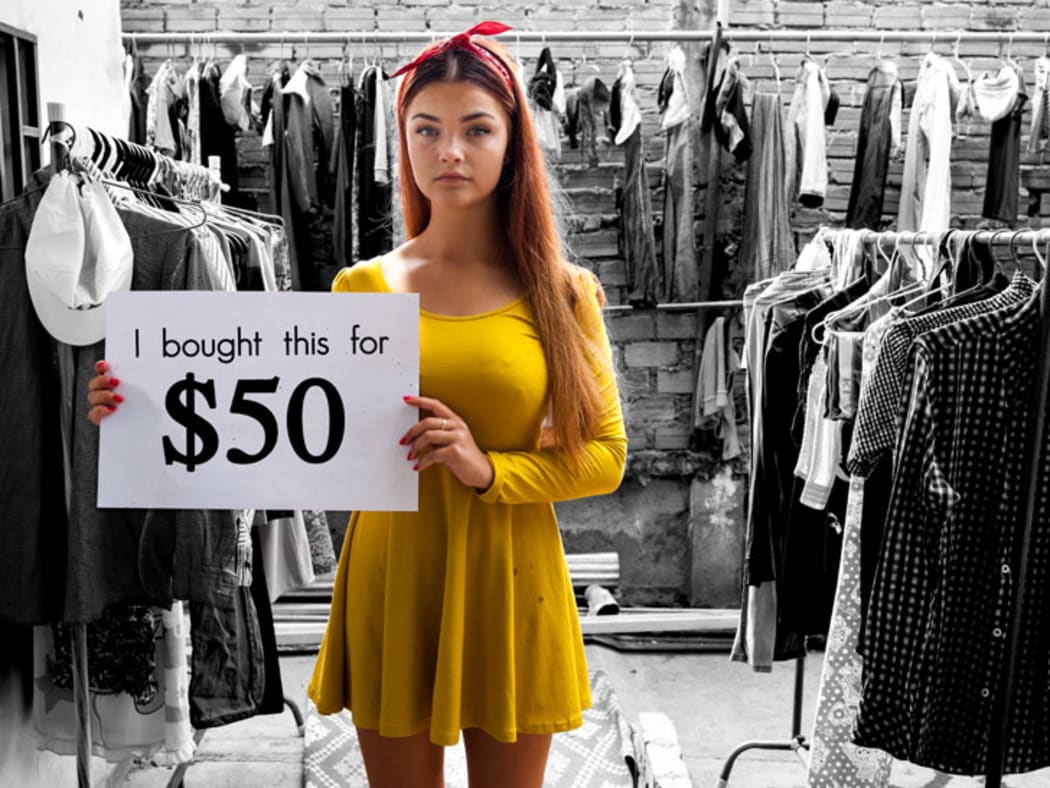
Frida Ottessen Photo: Supplied
Most teenagers don’t think much about where their clothes come from or who makes them. A reality TV show produced by Norway’s largest newspaper is getting a lot of attention around the world for taking three teenagers to Cambodia to confront the reality of sweatshops and the conditions endured by some garment workers.
“This is not a ‘Keeping up with the Kardashians’ this is reality reality” says Joakim Kleven, the producer and director of the internet series, Sweatshop: Deadly Fashion. He tells Noelle McCarthy on Afternoons that the three teenagers had no idea what to expect when they arrived in Phnom Penh.
”The plan was for the three teenagers to feel what it’s like to be a Cambodian garment worker. So it was like live, work, eat, sleep, repeat” says Kleven.
Frida Ottesen says she was a naïve 17 year old who had never left Norway when she agreed to take part in the series. “I had a job, I had money if I wanted to I could buy clothes. I was that naive I thought the clothes were made by machines. When I found out that the clothes were sewn by people it was kind of shocking,” she tells Noelle McCarthy.
Producers arranged for the three teenagers to live with a garment worker. They slept on the floor of her tiny one room apartment. “She didn’t even have a bed because she could not afford one” says Ottesen. “The next day we got up at 5am. We didn’t get breakfast we travelled to the factory. The first thing I thought was we will learn how to sew, watch them work, see how it is there and walk away,” recalls Ottesen. But the Norwegians worked side by side with the Cambodian workers and sewed the same seam on the same T-shirt for eight hours. “I was so hungry, I hadn’t slept that night, after those eight hours all I earned was $3 a day. I realized this is terrifying and horrible and it is unfair. They work so many hours. It’s messed up”.
And this was one of the better factories in Cambodia according to Joakim Kleven, and one of the only ones to allow cameras inside. He says it was very hot with no air conditioning and only hard plastic chairs to sit on. But, he says "it’s a pretty nice factory. The worker the teenagers stayed with dreamed of working there."
The next challenge for Frida and her friends was to try and live on the $3 a day they were given for their eight hours in front of a sewing machine. Producers asked the teenagers to buy dinner for the crew and their host, a total of 12 adults, using only the $9 combined they earned that day. Frida says “we went to the market and bought carrots and potatoes. It was really just garlic water soup. It was hard to see what I could buy with that money."
Frida and the others took their host shopping for clothes as well. She found a jacket she had sewn herself in one of the factories, but told the teenagers it would take her a full year’s salary to buy it. “She can only buy herself clothes two times a year for $2."
After just a few days walking in the shoes of the Cambodian garment workers, Kleven says their attitudes changed. “They really understand how hard and unfair it is compared to their lives in Norway. They’ve seen both sides of the world now. It easily could have been us,” he adds.
One of the teenagers says during the series, that everyone knew the world was unfair, but now she knows what unfair really means. Frida and the others now think about where their clothes come from before they buy them and try to understand why it took a trip half way around the world to think about these issues. “We see sad news every day” Frida tells Noelle. “We read about sad things all the time around the world. There is so much to take in, so much to care about so much need we don’t have time to care for everything. When you first get there you realize this is how it works and you meet them face to face. It’s so emotional."

